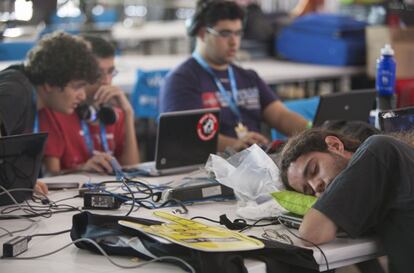Long naps linked with increased risk of stroke
A new study has found an association, though not necessarily a causal effect, between poor quality sleep and a higher likelihood of a cardiovascular accident

People who sleep poorly are more at risk of having a stroke. That’s according to a study published Wednesday in the journal Neurology, which listed sleeping too little or too much, snoring, snorting and sleep apnea as dangerous sleep problems. The authors observed, for example, that people who slept less than five hours a day on average were three times more likely to suffer a stroke than those who slept an average of seven hours.
Prolonged napping — defined as naps that are longer than an hour — was also linked with a higher risk of stroke, as was unplanned napping. People who napped for longer than an hour had an 88% higher risk than those who did not, a figure similar to the increased risk for snoring (91%). While snorting and sleep apnea tripled the risk of stroke. The researchers, led by Christine McCarthy from the University of Galway (Ireland), found that when other factors such as smoking, drinking alcohol, physical activity and depression were controlled for, the link between sleeping problems and the risk of stroke remained similar.
The study, which included 4,496 people, half of whom had suffered a stroke, only observed the relationship between the two, and cannot attribute sleeping problems for causing a stroke. But McCarthy had some explanations about why the two may be related. “Lack of sleep may be associated with stroke risk factors, such as high blood pressure, for example, but it may also be a sign of another unknown disease,” she points out. “Sleeping too much can be caused by some underlying disease, but it can also be because [the person] has no physiological challenges.” In some cases, such as very long or unplanned naps, the problem may be due to the fact that the individual is taking sedatives for other disorders. According to McCarthy, more studies are needed to verify whether increasing or reducing the time a person sleeps — depending on whether they nap too long or sleep too little — “could improve the risk of suffering a stroke.”
Gerard Mayá, a neurologist at the sleep unit at the Hospital Clínic de Barcelona, Spain, who did not participate in the research, points out that while the results are not surprising, they “support conclusions made in other research with a study of a large number of patients.” He also notes that while there is a link between sleeping poorly and a greater risk of stroke, “the fact that someone snores or suffers from sleep apnea does not mean that they are necessarily going to have a stroke.” According to Mayá, the risk of each sleep problem are different, with obstructive apnea presenting “the most evidence as a risk factor.” Snoring, on the other hand, if it is not accompanied by other issues, does not have to be a problem. “But almost everyone who has apnea, snores,” explains Mayá, which is why it is a risk factor.
Like McCarthy, Mayá believes that more research is needed to study the reasons behind the links observed in papers such as the one published in Neurology. “There is controversy, for example, about whether insomnia increases the risk of stroke, since it can have many causes. A specialist must evaluate this to find out if it increases the risk, and then apply the appropriate pharmacological or non-pharmacological treatments in each case,” says Mayá.
The researchers of the study in Neurology — which follows recent papers focusing on the link between sleep and cardiovascular risk — may encourage doctors to include sleep problems among the factors to watch out for in their patients. McCarthy says that while it’s not known if improving sleeping conditions can reduce the risk of stroke, “their treatment can have a positive impact on quality of life and, possibly, other health problems.”
Mayá, who is a member of the Spanish Sleep Society, agrees that more research is needed into how sleep affects risk factors for stroke, but also stresses that sleep is essential to health. “It’s often thought that when we are sleeping, the brain is resting and that’s it. But it’s not like that,” he explains. “The brain performs many vital functions in that time, and if we don’t sleep, we die. The record without sleep is only 11 days and there is a type of insomnia, called familial insomnia, which has an average life expectancy of 18 months. Sleep is vital, not only because of strokes. [Lack of sleep] also increases the risk of hypertension, accidents, diabetes, obesity, cancer, long-term dementia, and depression is also increased.”
Sign up for our weekly newsletter to get more English-language news coverage from EL PAÍS USA Edition
Tu suscripción se está usando en otro dispositivo
¿Quieres añadir otro usuario a tu suscripción?
Si continúas leyendo en este dispositivo, no se podrá leer en el otro.
FlechaTu suscripción se está usando en otro dispositivo y solo puedes acceder a EL PAÍS desde un dispositivo a la vez.
Si quieres compartir tu cuenta, cambia tu suscripción a la modalidad Premium, así podrás añadir otro usuario. Cada uno accederá con su propia cuenta de email, lo que os permitirá personalizar vuestra experiencia en EL PAÍS.
¿Tienes una suscripción de empresa? Accede aquí para contratar más cuentas.
En el caso de no saber quién está usando tu cuenta, te recomendamos cambiar tu contraseña aquí.
Si decides continuar compartiendo tu cuenta, este mensaje se mostrará en tu dispositivo y en el de la otra persona que está usando tu cuenta de forma indefinida, afectando a tu experiencia de lectura. Puedes consultar aquí los términos y condiciones de la suscripción digital.









































